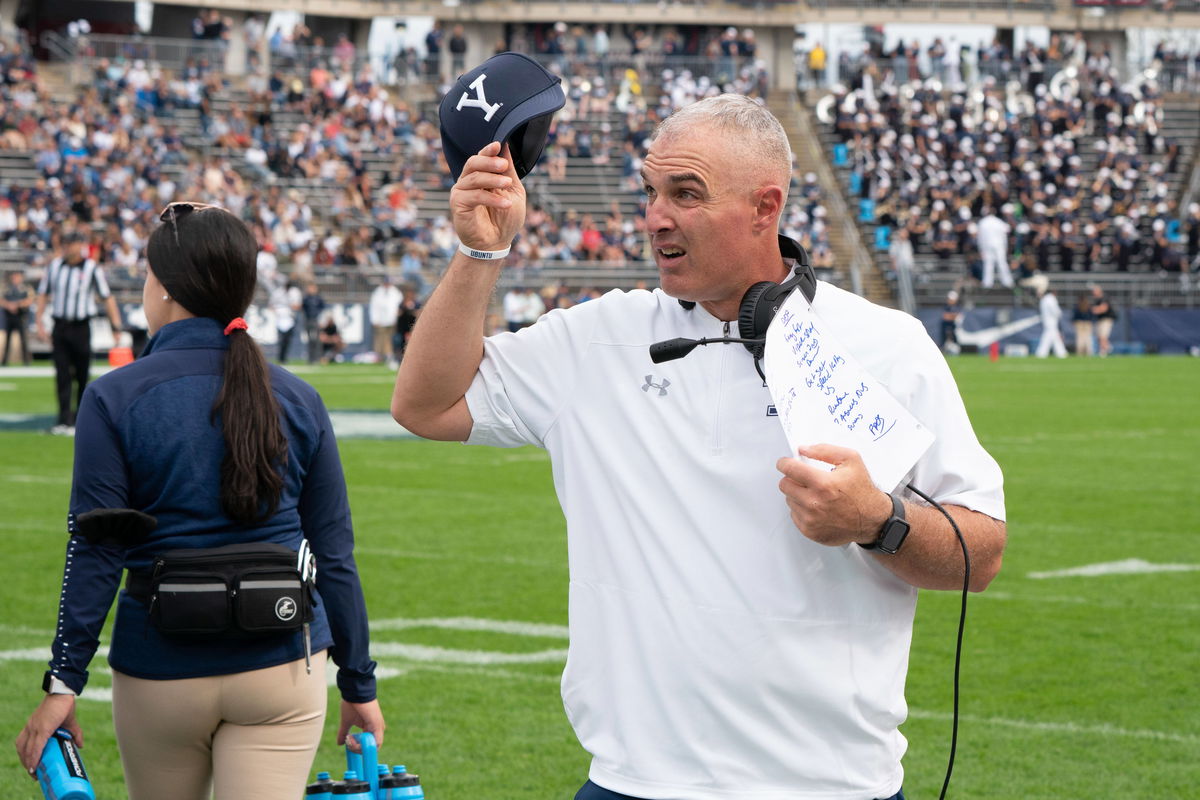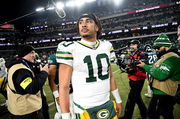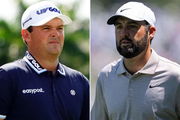
USA Today via Reuters
NCAA, College League, USA Football: Yale at Connecticut, Oct 16, 2021 East Hartford, Connecticut, USA Yale Bulldogs head coach Tony Reno looks up at the scoreboard during the first half against the Connecticut Huskies at Rentschler Field at Pratt & Whitney Stadium. Mandatory Credit: Gregory Fisher-USA TODAY Sports, 16.10.2021 13:08:26, 16979243, NCAA Football, Connecticut, Yale Bulldogs, Yale, Connecticut Huskies, Rentschler Field PUBLICATIONxINxGERxSUIxAUTxONLY Copyright: xGregoryxFisherx 16979243

USA Today via Reuters
NCAA, College League, USA Football: Yale at Connecticut, Oct 16, 2021 East Hartford, Connecticut, USA Yale Bulldogs head coach Tony Reno looks up at the scoreboard during the first half against the Connecticut Huskies at Rentschler Field at Pratt & Whitney Stadium. Mandatory Credit: Gregory Fisher-USA TODAY Sports, 16.10.2021 13:08:26, 16979243, NCAA Football, Connecticut, Yale Bulldogs, Yale, Connecticut Huskies, Rentschler Field PUBLICATIONxINxGERxSUIxAUTxONLY Copyright: xGregoryxFisherx 16979243
Football has always been seen as a game of strength, agility, and strategy, and it is definitely a mixture of all three. But the qualities that truly unite this marvelous sport together often flies under the radar. It’s teamwork, synergy, and, most importantly, leadership. Most coaches focus on the former. They build rosters through raw talent and refine them through physical training and tactics. But a few see something deeper. They understand that the threads binding the pigskin run beyond muscle and mechanics. These are the coaches who raise their teams, not just in skill but in culture, and who consistently find themselves in the upper echelon of standings.
Watch What’s Trending Now!
Yale Bulldogs have been fortunate enough to find one such coach, Tony Reno. Tony inherited Yale’s football program when he was only 37. And he said to Ryan Hawk on The Learning Leader Show, “When you get hired at 37 years old, you know usually something’s wrong. Either that or you’re just you’re just ridiculously good and I was not, I was not ridiculously good.” Yale was a storied program with a rich history, but it was disconnected from its identity. The players were drifting emotionally from the university that they wore across their chests. And Tony knew the importance of belief in one’s university. To counter this issue, Tony took the help of a person whom he described as “the most important relationship of his life.”
And that special person was General Stanley A. McChrystal. A retired four-star Army general who, at the time, was quietly teaching a leadership course at Yale. While flipping through university resources in his early days as head coach, Tony stumbled upon McChrystal’s name and paused. “This dude’s here?” he recalled thinking. It wasn’t a typical coaching move, but Tony wasn’t looking for typical either. He reached out to McChrystal, hoping for a meeting. Within days, McChrystal responded. They met for lunch. Reno explained the fractured state of his program and his vision for something far greater than just game-day success. “I have a dream to build a leadership program here,” he told the general. McChrystal didn’t hesitate: “I’d love to help.”
ADVERTISEMENT
Three months later, McChrystal addressed the team in one of Yale’s historic lecture halls. The speech wasn’t about football. It was about unity, responsibility, and becoming part of something larger than yourself. That single moment lit a fuse. Over the next year, the two men met regularly, refining a blueprint to place leadership at the center of Yale Football’s identity. What began as a guest appearance turned into a mentorship and, eventually, a friendship. “He’s become a mentor, a friend, someone I pick up the phone and ask, ‘What do you think about this?’” Reno said. “It’s been the most magical thing we’ve done here at Yale.”
Twelve years later, Yale is back in its glory days. Not just in wins or championships, but in the transformation of young athletes into leaders. Reno’s belief that character is as important as conditioning has turned Yale’s locker room into a breeding ground for integrity and accountability. What started as an uncertain coaching tenure for a 37-year-old has evolved into a case study in long-term vision and leadership. And all was possible because of two entities. A football coach looking to heal a fractured football team, and a general ready to build something lasting.
ADVERTISEMENT
Yale’s transformation under Tony Reno
Since Tony Reno arrived in 2012, Yale Football has undergone a transformation that’s hard to miss—but easy to measure. In a league that is known for its toughness, Yale hasn’t finished in the lower half of the standings in 13 years. And that’s not it. They’ve secured four Ivy League championships (2017, 2019, 2022, and 2023), returning to prominence in the Ivy League. That 2017 title marked Yale’s first conference title since 2006, and they’ve been consistent ever since.
Reno’s impact is evident in the players he has shaped. His tenure has produced a plethora of All-Ivy selections and Ivy League Players of the Year. For context, from 1975 to 2012, Yale had only one Ivy League Player of the Year. But since Reno took over, Yale’s tally has gone up to five. Moreover, linebacker Foyesade Oluokun, one of Reno’s most well-known pupils, has transitioned from Yale’s locker room to leading the NFL in tackles. His rise is a testament to the fact that Reno’s leadership-driven approach is the blueprint to building pros.
ADVERTISEMENT
Top Stories
Patrick Mahomes’ Dad Faces 10-Year Prison Sentence After Chiefs QB’s Father Reportedly Violated Probation Terms

Prayers Pour In From Jordan Love & Co. as Cowboys Star Mourns Tragic Personal Loss

Justin Jefferson Makes Final Decision on Joining Buffalo Bills After Further Damaging J.J. McCarthy Relationship

Matthew Stafford Makes Final Decision on Retirement After Narrowly Beating Drake Maye For NFL MVP

Multiple PGA Tour Pros Stopped from Playing as WM Phoenix Open Round Is Canceled Over Recurring Problem

PGA Tour Split Into Two as Scottie Scheffler Confirms Stance on Patrick Reed’s Return

Perhaps most impressive, though, is the consistency. Across 12 seasons, Reno has stacked winning records like clockwork, creating a program where stability is the norm and mediocrity simply doesn’t exist. What began as a rebuild has now become the blueprint. In an Ivy League where every game feels like a rivalry, Reno’s version of Yale Football is one of the most respected and reliably dangerous programs in the conference. And it’s all anchored in the culture he and General McChrystal imagined 12 years ago.
ADVERTISEMENT
ADVERTISEMENT
ADVERTISEMENT
.png)
.png)
.png)



